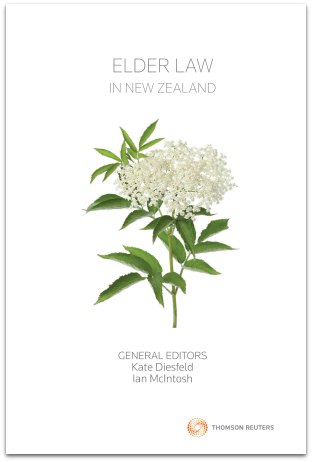Coming ready or not - Elder law in NZ
The boomers are the largest growing population group in New Zealand. How do we cater for their diverse legal needs?
Co-editor of "Elder Law in New Zealand" Kate Diesfeld talks to Susan Dugdale (Online Insider) about how her interest in the field developed, what the book sets out to do, and its many contributors. Susan Dugdale looks back ...
I remember bellowing the Beatles hit “When I get older losing my hair, many years from now… will you still care for, will you still need me when I’m 64” at student parties in happy ignorance. That’s awhile ago now and that hitherto impossible to imagine birthday is looming – coming ready or not.
There are a lot of us in the same boat. And there is nothing we can do to stop it.
Let’s be outrageous and call it what it is – old. Let’s spurn the euphemisms - the numbing tenderness of the “twilight years” or that syrupy drift into a “golden sunset”. Sod to being called the “young at heart” and “senior citizen” has all the frisson and glamour of a civic monument erected by committee. We are not “silver foxes”, “prime timers” or “third agers”. What we are is people ageing, getting older, and many of us do not want to go gently into that good night, especially if it means being lumped together under a twee label.
Boomers - it's a growth sector
If you, like me, were born between 1946 and 1964 you fit the 18 year span dubbed the Baby Boomer years. This cohort is the largest growing population group in NZ.
Despite a move to implement a positive ageing strategy there has been no cohesive, consolidated and collaborative commitment to actively meet the collective needs of the boomers as they stride, or slide, into their final years.
Elder Law in New Zealand
Enter “Elder Law in New Zealand” edited by Kate Diesfeld and Ian McIntosh. And as Margaret Bedggood says in its Foreword:
In some ways the title is misleading. For this is not only a book for lawyers or about various aspects of the law; rather it is about the law in its best and widest sense, law in its multiple contexts, legal, social, political and relating to health care.
The book is a compendium – a practical inclusive handbook, illuminating the salient legal issues of that vast and ultimately democratic territory called ageing into which we are all headed, regardless of who or where we are.
 Co-editor Kate Diesfeld: her interest in the field and the book
Co-editor Kate Diesfeld: her interest in the field and the book
In an interview for Online Insider Kate Diesfeld, co editor of “Elder Law in New Zealand” shares the impetus behind its publication.
The questions Kate was asked are highlighted. Her answers are directly below them.
Kate, your areas of specialty are largely in the fields of disability and mental health. What propelled you into elder law?
My family was dedicated to our elders. Both grandmothers lived in our family home until they passed away. Also, my father, a country doctor, used to take me on his house calls to the nursing home where older people lived in our village in rural New York. He knew the therapeutic value of having young visitors in nursing homes.
Could you share the formative experiences leading to your mental health and disability specialty focus?
Two of these occurred in Alaska during the 1980s. I had completed an undergraduate degree in New York and Alaska offered the perfect combination of adventure and work experience. My official title was Court Investigator for the Probate Court.
The first situation involved a young woman with Downs Syndrome. Despite her parents’ intention to protect her interests through limited powers of guardianship, her lawyer lazily applied for full powers, using a form from a previous client, including the wrong name, gender and birthdate. The application for full guardianship powers was filed, despite the young woman’s many skills and achievements. She organised and led a youth group, grocery shopped, cooked the family meals and babysat her siblings. This was the first instance when I contemplated becoming a lawyer to promote the interests and protect the freedoms of disabled people.
The second case illuminated conditions that many people older face. It involved an elderly woman on a Pribolof Island, who was both dependent upon, and neglected by, her adult child. While her deteriorating physical health required urgent attention on the mainland, she preferred to remain in her native community. These and similar cases involving people with diverse disabilities inspired me to study at a law school that specialised in mental health law.
Law school and beyond
After graduating from University of San Diego School of Law, I represented people with intellectual disabilities at Protection and Advocacy, Inc in Los Angeles. In 1992, the Kent Law School at the University of Kent at Canterbury invited me to open and supervise the Kent Law Clinic (Mental Health and Learning Disabilities). This programme aimed to inspire and train a new generation of mental health lawyers. Also, I had the great fortune to represent people before the Mental Health Review Tribunal for 8 years. These experiences reinforced the importance of the law as an instrument of change and protection.
My work in New Zealand
When I immigrated to New Zealand in 2000 I was eager to work with older people. Within the first month, I applied as a Volunteer Visitor with Age Concern. My first New Zealand job, and one of the most meaningful of my life, was as a care assistant for very disabled people in a rest home in Auckland. There are few opportunities to have that type of intimate, and impactful, role. Later Age Concern Auckland invited me to be a Council Member, where I observed the mighty spirit of colleagues who had been advocates on many fronts, over many decades, in New Zealand.
Those experiences in a rest home and at Age Concern were very informative. They revealed that many people, regardless of their conditions, and across the lifespan, face three issues: where they will live, how they will live, and how they will fund it. But the field of elder law may encompass other, and often urgent matters, such as how to obtain pensions, to draft a will, and to have one’s preferences honoured if one becomes less competent.
The beauty of collaborating on "Elder Law in New Zealand" has been the collective creation of a text that has real utility, and can be viewed as advance legal planning for all New Zealanders.
 Could you tell us about the scope of “Elder Law in New Zealand”? How did you decide what was to be in the book?
Could you tell us about the scope of “Elder Law in New Zealand”? How did you decide what was to be in the book?
First Ian McIntosh, the co-editor, and I had to map the legal landscape. We envisioned a “day-in-a-life” of an older person, from their mental and physical health, to their wealth, to their social lives. Aiming to make the book as useful as possible, we located the legal and non-legal experts who were willing to focus their knowledge on the issues that older people face. The contributors are champions and their combined influence may have far reaching benefits for older people.
The 23 chapters include examination of national policies, such as ageing in place, and trends in health conditions that will have legal implications. The chapters detail the relevant legislation and case law from human rights to decision-making, from pensions and benefits, to entitlements to housing, health care, and accident compensation. Both advocates, lawyers and academics contributed to the chapters including access to residential care, creation of wills and trusts, and prevention of elder abuse. Importantly, there are chapters on emerging issues for our ageing population, including the legal issues faced by grandparents and people with intellectual disability.
Who do you see this book benefiting?
All people who are interested in advance planning for themselves or older people will find the book invaluable. That includes lawyers, community law centres and community advice bureaux. The theory and the detail will benefit academics who train our next generation of health providers and lawyers. Also, employees of District Health Boards and other organisations devoted to other people will want copies at close hand.
We envision that this is the first stage of a national momentum with, and on behalf, of older people.
Thanks Kate – we boomers appreciate it.
For more information
To read reviews and a sample extract (which includes the full Table of Contents as well as excerpts from chapters) please click "Elder Law in New Zealand".
Contributors to Elder Law in New Zealand at the book's launch 14 April, Otago University
[caption id="attachment_6865" align="aligncenter" width="500"] Colin Gavaghan, Brigit Mirfin-Veitch. Ian McIntosh, Kate Diesfeld, Mark Henaghan, Margaret Briggs, Nicola Peart[/caption]
Colin Gavaghan, Brigit Mirfin-Veitch. Ian McIntosh, Kate Diesfeld, Mark Henaghan, Margaret Briggs, Nicola Peart[/caption]